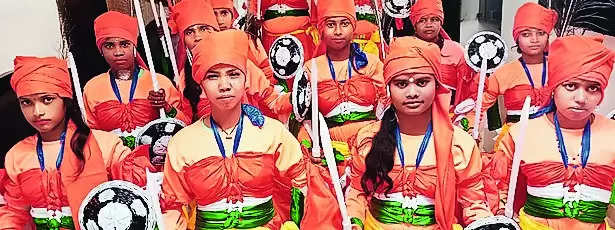In A First, 16 Women From Jsr To Display Male-dominated Paika Dance On R-day | Ranchi News
Jamshedpur: A group of 16 girls and women from Shukla village, around 30 kilometres from Jamshedpur, are penning a new story of gender equality as it formed the first Paika dance troupe, which is an otherwise a male-dominated area. The group – schoolgirls to 30-year-old mothers hailing from the village in Bodam, East Singhbhum – will perform for the first time at the 75th Republic Day parade in New Delhi this year.
According to the lore, kings or leaders used to enact the warrior dance form, native to the Munda tribe, to be agile and practise combat.Hence, in Jharkhand, the men dominated the area of Paika dance.
“The dance form uses bows, arrows, spears, swords and shields because it is a dance of the warriors performed only by the men. Although that has been the tradition for ages, some girls also expressed their wish to learn and perform the dance. Last year, during the Durga Puja, we started forming an all-women group, and we got 16 of them till December. They have already left for New Delhi and shall have their first important performance there,” Biswadev Mahato, a Paika and a Chhau dancer, said.
The girls in the group believe that adapting to Paika dance would change the thought process of the society, especially in areas where women are not encouraged to perform arts. Although tribal culture promotes singing and dancing, some communities are not encouraged to perform outside their villages or hamlets. These girls now attend regular classes and aim to travel to places. Fifteen-year-old Harapriya Mahato, one of the students, said that girls from their village were always interested in learning Paika dance.
According to the lore, kings or leaders used to enact the warrior dance form, native to the Munda tribe, to be agile and practise combat.Hence, in Jharkhand, the men dominated the area of Paika dance.
“The dance form uses bows, arrows, spears, swords and shields because it is a dance of the warriors performed only by the men. Although that has been the tradition for ages, some girls also expressed their wish to learn and perform the dance. Last year, during the Durga Puja, we started forming an all-women group, and we got 16 of them till December. They have already left for New Delhi and shall have their first important performance there,” Biswadev Mahato, a Paika and a Chhau dancer, said.
The girls in the group believe that adapting to Paika dance would change the thought process of the society, especially in areas where women are not encouraged to perform arts. Although tribal culture promotes singing and dancing, some communities are not encouraged to perform outside their villages or hamlets. These girls now attend regular classes and aim to travel to places. Fifteen-year-old Harapriya Mahato, one of the students, said that girls from their village were always interested in learning Paika dance.

